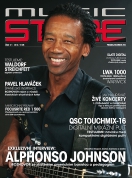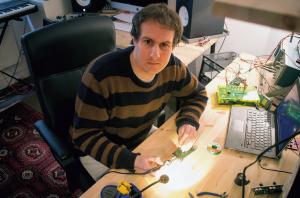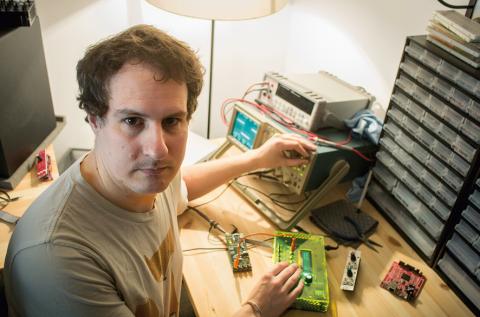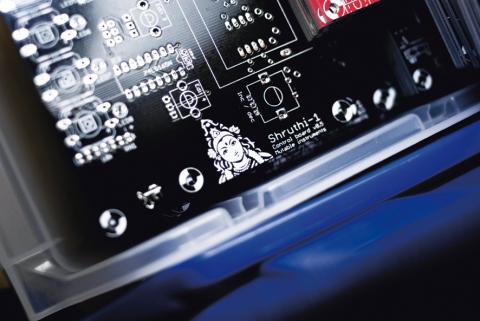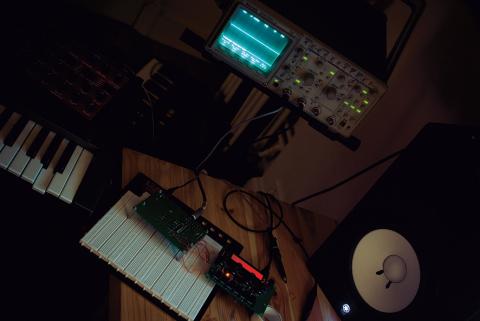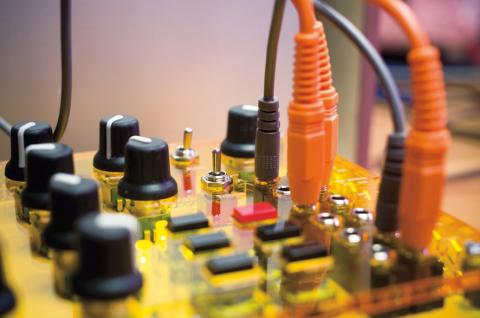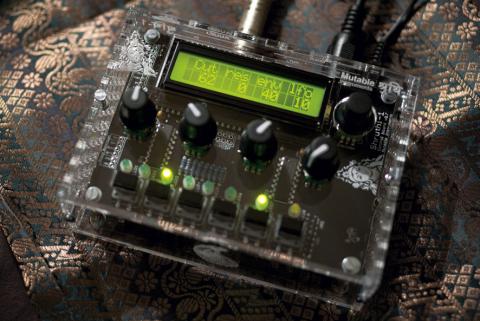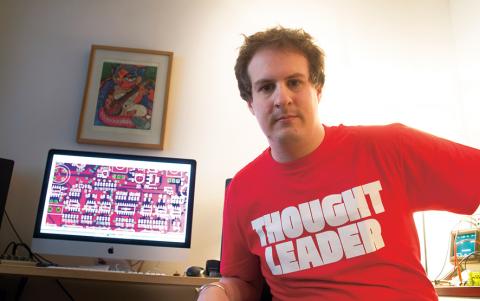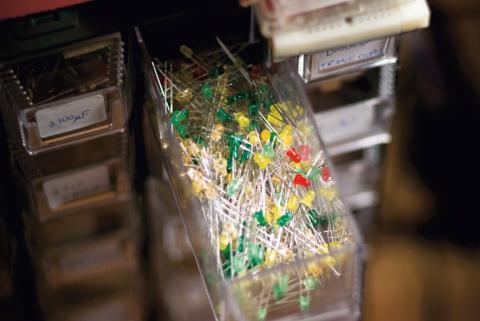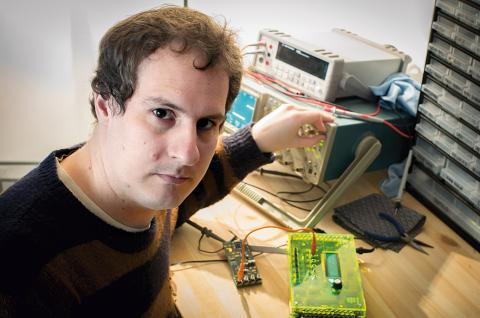As already mentioned, it all started with one little acrylic box with high quality sound, behind which stands the designer Olivier Gillet, the owner of a dynamic French company Mutable Instruments – the manufacturer of DIY kits Shruthi synthesizer and Ambika, but also of the quality modules for modular synthesizers. The results of Olivier's work has a special charm in themselves - are well thought out, honest processed and have a great design. That's why I became more interested in the project commissioned by Mutable Instruments and tried to reveal another connections. Who is thirty-three years old Olivier Gillet from Paris? What's his story? To get answers to these and many other questions, we decided to ask for an interview with Olivier.
Olivier's openness and detailsl of his responses surprised us very pleasantly. We bring you, among other things, the story of how a programmer of "useless" applications for smartphones became the owner of the company that produces high quality design modules for modular synthesizer, working with people from all over Europe. Maybe, this story will inspire your own dreams. It also could be just kind of a manual about how not to be afraid to use your abilities and skills and how to start your own business.
Hello Olivier. First of all we would like to thank you for you being open to give us an interview – really appreciate it. Reading your annual report about Mutable Instruments (from your website) I suppose you're a very busy man. Could you actually reveal your everyday routine for us?
I go to work at 9 (The workshop I rent is just two streets away from my apartment), work from 9 to 13 on stuff related to the existing product line (upgrades, managing production, preparing and shipping orders, customer service, email), eat, take a nap, and work from 15 to 20 on R&D for new products. I sometimes do long coding or PCB routing marathons at night or during week-ends - this tends to be work for which I do not want any kind of interruption. That's the theory - in practice there are periods of imbalance between the production/sales and R&D activities - in november, december and january for example I spent almost all my time taking care of the DIY business and the rush of orders following the release of new kits. While I'll spend of my days in february, march and april on new stuff!
This could be a very often question, but we're very interested in story behind the beginning of the Mutable Instruments. Can you tell us how the adventure of Mutable Instruments began? What led (inspired) you to start the company?
In july 2009 a friend showed me a link to a silly Arduino based project. I worked in software but knew very little about microcontrollers and electronics, so it was a kind of revelation toknow that I could buy for 5€ a simple chip (ATMega328p) that could be loaded with C code with no hassles about drivers, bootloaders, expensive compilers, external memory chips... At the time I was writing programs that ran on enormous computer clusters, so writing code with a 2k RAM limit and 32k size limit sounded like a fun challenge, reminding me of the limits we had when writing Amiga or PC demos in the mid 90s. I wanted to make something with this ATMega328p chip, and use it as a motivation to learn electronics. This project became the Shruti synth and since there was an interest for it, I started selling kits. As I understood electronics better (and the economics that go with it), I reworked the design to make it easier to build and to find parts for. The demand continued growing and it evolved into a full-time activity for me in march 2012. Mutable instruments started paying me a salary in early 2013.
Suppose the Mutable Instruments wasn't always your full time job, at least at the beginning of your company. Could you please tell us what did you make for a living before you started make a synths?
I did research and wrote software, in the fields of large scale data analysis & machine learning; and also signal "understanding" (speech recognition, music classification, computer vision).
What was actually the turning point that made you to make the decision to stay on your own feet?
I've worked for different employers in the years before Mutable Instruments and never felt at home anywhere. People respected me for my engineering skills but never thought it would be nice to involve me with product design or ask my advice on aesthetics because that's not what the R&D guy is supposed to do. I wanted a place in which I could be a bit of everything - engineer, artist, inventor - and in today's job market, only my own company could be this place. In parallel, I was becoming increasingly disappointed by the business models of tech companies - data collection, garbage smartphone apps, ad-supported "free" products - all this stuff irrationally supported by venture-capital. It felt way healthier to sell an actual physical product.
Actually, how many employees does Mutable Instrument have now?
From an accounting point of view, this is just me - but of course I'm no longer doing everything by myself! A freelance graphic designer from Italy handles the creation of panel graphics, a small german company does the plexiglas cutting and sorts the parts, and the Eurorack modules are built by a large electronics manufacturer in the west of France. And thanks god I don't have to do all the accounting and taxes myself! At any time of the year there's always someone somewhere in Europe doing something useful for Mutable Instruments!
If I'm not mistaken, you once said: „I knew nothing about electronics...“ Do you think that your DIY synths could be kind of a challenge (in a positive way) for people who are at the start point of this knowledge?
Not exactly a challenge, but it's a proof that designing electronic products is no longer something that only big companies can do... And a hint that people can try taking this road and invent their own things. There are a bunch of other projects that have appeared from other members of the Shruthi community - TubeOhm's filter boards, MIDIsizer's sequencers and loopers, D-machinery's eurorack module kits, the PreenFM synth... People just needed to be shown the road!
Your website – appearance and everything connected with the presentation of the company – is characterized wih high-quality images, very smart design and gripping texts. Does this awesome work also come from your own head and hands? Are you also into graphic design?
The website and panel art is from Hannes Pasqualini - an Italian comics artist and graphic designer who has been essential in giving Mutable Instruments its current visual "face". I'm very sensitive to design myself - I have my own artistic vision - but lack the skills to realize it! So I sent him plenty of pictures of things I liked and things I disliked, art books, sketches, and he managed to make sense of it. I write the texts and take the photos, though - photography has been one of my hobbies before all my time got sucked into making synths.
As a founder and a brain of Mutable Instrument, could you please elaborate about the philosophy behind your project?
Creating electronic music instruments is just another kind of art, and as such is a form of self-expression. My instruments are a mirror of who I am and the things I like... The synths, sounds, music I enjoy... The things I like in terms of engineering (well-thought, but not unnecesserarily complex)... My values (openness, transparency, democracy rather than elitism).
The terminology of your products and the design features draw the inspiration from Indian culture. Actually I've found out that Shruthi means „cosmic sound of God“. And your Shruthi really has a unique sound, btw. Could you tell us what impress you most on Indian culture and why did you decided to incorporate it to your „story“?
The first sound-making device I ever built with the ATmega328p was an all-in-one clone of these indian electronic sound generators ("shrutibox" and "electronic tanpura"). The directory containing the code was called "shruti". I tweaked it later and it envolved into a synth – the name stayed. But besides the support for tunings other than equal-temperament, my synths have no connection with Indian music -which I enjoy myself, but not to the point of learning how to play it or being a nerd about it. Besides this starting point, there are several "threads" that explain the use of indian cues in the design of my products: - "Self-expression" - if I want my instruments to reflect who I am, then there certainly must be these references to India somewhere because it has played and plays an important part in my life and personal history. People might think I am spiritual... I am not. But I am deeply fond of India's visual arts, crafts, and textiles. - Because I find it kind of sad that the aesthetic vocabulary of most synth manufacturers is limited to "laboratory equipment", "space & science-fiction" and a certain form of macho "badassness".
Some of the special editions of Shruthi are connected with an original story, supported with related and highly-developed visual features. Could you please elaborate about the story behind the 4Pole edition? To be honest, I have a very – let's say – close relationship with it...
I watched this movie in january 2012 and it crystalized some ideas that were floating in my head. That of a polymorph/mutant filter who could imitate any character/response via pole-mixing and a switchable saturation circuit, like the beast in the movie. That of doing an ice-white case with LEDs glowing behind. It sounded a bit over-the-top and silly but I had the freedom to do it, and it would have been a shame if I had just given up on this idea.
What does the DIY spirit/approach means to you? I'm asking because you were actually my inspiration for the series of DIY articles for Music Store magazine...
One big misunderstanding is to consider me as a DIY guy... I got into selling DIY products because this looked like the best way of letting people get my products when I started. Ironically, I think some of my customers are way better at DIY than I am, and maybe the Shruthi kit is so pleasant to build because I would have been unable to build something more complicated myself (for example, I absolutely hate soldering cables/wires between parts – so all my parts are directly PCB mounted). Now that I have gained more experience with electronics design and have gone through the steps necessary to have a product industrially made... I am not sure I'll continue designing DIY kits. But there'll always be cool DIY projects around, I am very proud to see that some Mutable Instruments customers are turning into designers and selling their own kits.
On the the other side I've realized that you do a soldering workshops, where people have an opportunity to make your kit. What response do you have about those kind of events?
Such events are helpful in that they attract people who are lacking the confidence to start a new DIY project by themselves. It's a very safe experience - there are people around to help you, stop you before you make a mistake. And usually, these shy beginners are those whomake the cleanest solder joints!
I suppose that the community of people interested in DIY also generate a great feedback you can work with while designing new products. How important is the user feedback for you, actually?
The community is a great source of motivation and inspiration... But it would be a mistake to blindly listen to them. Because they are not aware of the technical or financial limitations. And more importantly because they tend to imagine new products in terms of already existing products - "this product with more knobs", "this product with more VCOs". And this reminds me of that Henry Ford quote: "If I had asked people what they wanted, they would have said faster horses". The idea of a new synthesis technique or way of controlling a sequencer will come from me, not from suggestions.
Do you have kind of a personal contact with your users? I think this is something that has to be extremely appreciated from the public point of view (cause it seems to be impossible in the case of big companies)...
Yes I do, answering email and forum questions eats a lot of my time, but Mutable Instruments wouldn't be the same company if there was a customer support representative acting as a buffer. Craig Newmark is a source of inspiration to me.
I've read on your websites that you've already sold more than 2000 Shruthi kits what I find more than respectable. Now you're coming with XT versions enriched also with the controls of the instrument. How much are you satisfied with it's selling? Could we looking forward to another extension of this popular synth? Meaning new boards, modifications...
I'm quite happy with the XT sales. I plan to occasionally do new Shruthi filter boards and special editions. But we are very close to the limit of what the hardware architecture can do. And switching to more modern surface-mount chips would, in my opinion, destroy the charm of an instrument in which each indivudual part has been soldered by the builder.
You released the new synth Ambika – six voices polysynth – most recently. According to my friends, who have already built it, Ambika represents another very well-done product. Do you plan another modifications of it – for example the XT version (as for Shruthi). Is Ambika going to be the main thing of your interest?
Ambika was a mistake. I spent more than a year developing and polishing it, and the result is a product that I cannot really advertise and sell, because it's awfully complex and there's a good chance the builder will make a mistake that will give us long hours of headaches... And from a technical point of view, this a rough monster that cannot be industrially manufactured because everything in its design has been optimized for DIY assembly, using low-tech parts. So I don't plan to do an XT version of it or take it any further. I'm glad to see efforts from the community to bring new filter boards to this platform (such as TubeOhm's Ambika ladder filter). My focus is now on Eurorack modules.
I've also realized that you extended your production with the modules for the modular systems. What do you actually think about the modular synthesizers? It's easy to see kind of a boom of modulars in electronic music.
Eurorack modular synthesizers have recently become the "academia", "research facility" or "playground" of the world of synthesizers. This is where designers toy with new synthesis techniques (or rediscover gems from the past), explore new sequencing paradigms, offer entirely different architectures (west coast synthesis for example). And the public is loving it and asking for more. It is also a place where it is still possible to continue operating at human scale. Some well-respected companies in this field are actually "one-man-shows" just like me. How could I not move to this space?
Do your modules offer something different than we can find at competitors?
They pack A LOT of features into a single module. Other brands will sell you a FM VCO, then an analog modelling VCO, then a phase distortion VCO, and they'll have 3 products in their catalog which are just the same DSP board running a different firmware. My take is to pack all of them in a general purpose oscillator module (Braids). My modules don't adhere to the "west-coast" or "east-coast" philosophies but are a mix of both - taking advantage of the versatility of digital. They integrate features from novel or obscure research ideas. They are open-source, so you can actually mess with the digital synthesis code of Braids, or find new ways to use Grids as a trigger sequencer. Oh, and they have turquoise and fuschia knobs, and paisleys!
Can you mention some of your favorite creators of DIY instruments?
Mostly in the modular world: Yusynth, Tony Allgood (Oakley), CGS.
With what do you actually think the small manufactures could compete with the big companies like Korg, Moog or Arturia?
Two years ago, a small company could say "we're going to make a VCO/VCF/VCA/ADSR/LFO all-analog machine and make money with that". This is no longer possible, because analog is back into the mainstream, and big companies like Korg have the scale, momentum, and cultural heritage to be very good at that. So small hardware companies will have to reinvent themselves and think of product ideas that are too risky, or too weird/experimental for the big players. The modular format is one of these things. There are other paths - maybe some playful algorithmic stuff, some different ways of "performing" songs than pre-recorded patterns, or a revival of some digital synthesis techniques...
You have also mentioned once that, let me quote: „My biggest "anti-influence" is Moog.“ Could you elaborate about it?
Moog is living on its cultural heritage and takes pride in selling the same circuits over and over with as little changes as possible. I'm sure it works for them but this is not what I want Mutable Instruments to be. Change is in my name.
What makes a synth being a really good according to your opinion? What makes the difference?
Putting together individual circuits, no matter how good they are, just doesn't work - there needs to be an overall "plot" or "vision" or "context" that motivates the choice of each individual element. For example, some filter types do not work well in polyphony, or with digital waveforms. A lot of care has to be taken about the range of the parameters, and their response curves - for example so that when you move a knob from a point to another, you don't feel like the change in sound is "compressed" at the beginning or at the end of the trajectory. This is something I'm a bit obsessive about. A lot of care has to be taken when adding features. For example, if you want to add a new synthesis parameter B, and if this parameter gives absolute crap with half the course of parameter A, there's something wrong. I think a lot about my projects in terms of maps, parameter spaces, coordinate systems... I try to discover the "sweet spots" of a synthesis method and then stretch it over N knobs whose effect is as orthogonal from each other as possible. Designers have to be critical about what they do. When I built my first synth I used to visit music stores to try as many different synths are possible and compare them to what I was building. At first, it was humiliating, but there was a point at which I started feeling that what I was doing could stand the comparison.
Could you please elaborate about what impressed you at most about the analogue staff and what about the digital domain?
I like the digital domain for its versatility and its ability to create stuff from scratch. I picture this waveform in my mind, the easiest way to make it happen is with digital. I like the analog domain for its ability to react well, in a musical way, to inputs. I want this processing box with such audio inputs and CV inputs, and I want it to sound good whatever I'll throw at it...Then it feels like a job for analog for me. If you look at my product line, all modules which generate raw signals or modulations are digital, while those doing processing are analog.
How do you actually sell your kits. Suppose it isn't done thru the kind of traditional distribution channels... the kit is not something you can buy in the music store or something like that?!
Kits are sold on my website. I pack the boxes and ship them myself. It would not be economically feasible to sell them through music stores as this would either mean selling them at a 30-35% higher price (and then not very competitive with pre-assembled synths), or reducing my profit by this amount (making it pointless from a business point of view). Furthermore, music stores do not really have the skills to answer the kind of hairy questions that come before and after the sale (what kind of soldering iron will I need? LED4 doesn't light up,what's wrong, should I replace IC3?).
I was very impressed by your annual report about Mutable Instruments. You have really a very responsible and open approach – something not very common in our country. You also write about moving to bigger facilities – so I suppose the company is growing. What are actually your plans for the future regarding Mutable Instruments? Which way would you like to go with your instruments?
My primary goal is to expand my range of modules - there are dozens of new module ideas in my list! And after some time it's likely that my designs skills will be good enough for me to get back to standalone desktop synths...I don't really plan to develop new DIY kits. The stress and pain of selling a product that could very well not work in the hands of its builder is something that makes me very sad, and I don't think I want to experience more of this feeling.
Let's talk again about your work as a developer. A lot of people admire your efficiency, electronics and mathematics knowledge. My friend, local DIY expert, ones said: MI staff sounds so good because Olivier could calculate very well. What is actually your relationship with such exact sciences? Were you always talented in math? Do you have any approach how to receive „fast“ results?
In France, if you want to get admitted to the best engineering universities, you have to go through several years of abstract maths. I've travelled this road and I quite enjoyed it. It's a good tool and mindset to approach many problems.
Olivier, could you please tell us what makes you busy except the Mutable Instruments? Any other hobbies?
At the moment, it's taking pretty much all of my life! My wife is getting jealous! But I sort of asked for it, and it's an activity that encompasses so many things - having fun with synths, travelling, thinking about how things should look, solving engineering problems... There are a couple things I wish I had more time for - photography, travelling, programming experimental videogames, learning weaving and how to work with textiles.
I think our readers could be also curious about your music taste... What music do you like to listen?
The band that continues to deeply resonate with my life, and which still stays at the center of everything: Broadcast. And to a lesser extent, Stereolab. And around that, a mish-mash of everything... Portishead, Pram... Boards of Canada, the Advisory Circle, John Carpenter soundtracks, Etienne Jaumet... Tortoise, Trans-am, The Sea and Cake, Sam Prekop... Earlier, "classic" stuff like Brian Eno, the Talking Heads, Peter Gabriel, Jonathan Richman... Philip Glass, David Borden... The british synthpop I listened to as a kid and which exposed me to analog synth sounds for the first time... And a bit of everything else, really, from baroque to carnatic music... If I were listening to electronic music and synths all the time, I would feel like a prisoner in a cage! My ears need vacations!
There is a growing community of people that decide to take the direct control and create their own synths (or other stuff) from the electronic parts (DIY). Any final advice for them? Could you recommend us some interesting resources about the DIY?
Take the time to learn the theory! It's much better when you understand what you do! Check Aaron Lanterman's video lectures. Very good introduction to all the electronics you'll need to design synths. "NAND to Tetris", a very cool computer science curriculum that is the first ting I'd recommend to someone willing to understand programming a Pick a random circuit on CGS or Yusynth's sites, build it on a breadboard or recreate it in LTSpice and try to understand each part of it...
Great interivew, thank you very much, Olivier.
Download the original printed layout of the article (in english version):

